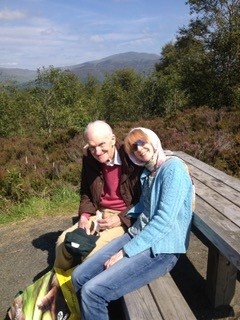The following blog was kindly provided for Carers Week by Alison who lives in North East Scotland and cares for her dad.
It’s over ten years since I moved back to my childhood home in Banchory in Aberdeenshire, to help care for my Dad after my Mum died.
Coming back felt weird at first. I’d left this small town aged 18 for student life in the big city and I’d spent thirty years forging my own path in various places across Scotland. Returning felt like a retrograde step.
But it didn’t take me long to realise that actually it was a good thing.
Banchory is where I have roots, connections, people who’ve known me all my life.
Out doing daily errands I bump into old school pals I grew up with and family friends who remember my Mum and know all about Dad’s head injury in a freak car accident. I talk to local GPs and community nurses who tended to Mum and Dad after the accident and understand the background to my caring situation. I know people who know people and that’s how we found our wonderful local carers, who’ve been coming to us for years and have become part of the family.
They all ask me how Dad is, how I’m getting on, tell me I’m doing a good job.
I feel seen, acknowledged, supported. It’s one of the many advantages of living in a smaller, semi-rural community.
Unfortunately, not all unpaid carers in this area are so lucky. Reliable paid carers are increasingly hard to find, especially in the more remote and scattered settlements further up the Dee valley.
The fact that many care providers fail to adequately recompense staff for the extra costs of travelling between more remote clients doesn’t help recruitment. Add in poor transport networks, lack of local services, problems staffing rural GP surgeries and pharmacies, fewer care homes and day centres for respite and you can see why rural carers face particularly stubborn challenges.
Since Covid many organisations provide support online. I’ve made use of that to access meetings and conferences that I couldn’t attend otherwise, but online has its limitations. It’s good to get out of the house and meet a real person now and again.
Caring isn’t easy wherever you live, but sometimes policy makers forget to look beyond the bigger centres of population. As we campaign for better recognition and support, let’s not forget the carers dotted throughout our small villages, remote glens and isolated farmhouses.
We all deserve our place on the map.
Find out more about Carers Week 2024 here.

